Plot
Having been stationed in the Subic Bay Naval Base in the Philippines as a member of the United States Marine Corps, NCO Sgt. Maj. William Bailey (Beery) is retired after having served there for 30 years. This happens several months prior to the Japanese bombing of Pearl Harbor and their laying siege to large areas of the South Pacific.
When the Japanese invade the Philippines, Bailey confronts and strangles a Nazi secret agent, who is now spreading anti-American, pro-Japanese propaganda among the native Filipinos. The spy had posed as a religious pacifist up until a devastating Japanese air bombing attack caused many casualties among the unarmed civilians that Bailey, his wife, and daughter (Maxwell) had been living among.
Bailey then takes command of the local Filipino militia that he had earlier trained just prior to his retirement from the Corps. They fight a series of delaying actions against a Japanese ground invasion force, slowing their attack, while waiting for the U.S. Marine island forces to arrive and counter-attack.
Later, after much fighting, while wearing his one time "dress blues" uniform jacket, Bailey takes out an enemy machine gun emplacement while Marine forces blow up a vital bridge, halting the Japanese ground advance. Sgt. Major Bailey is suddenly killed by an aerial bombing attack shortly after his heroic delaying actions have succeeded. The Japanese eventually go on to capture the Philippines.
Sometime later, at the Marine Corps Recruit Depot in San Diego, CA, Sgt. Major Bailey is posthumously awarded, by his former commander in the Philippines, the corps' highest medal for valor. His daughter, now a Marine sergeant, gratefully accepts the medal for her late father, as the entire base's assembled corps passes in review.
Reception
(Review by T.S., New York Times, August 30, 1943)
"That old saurian-countenanced leatherneck, Wallace Beery, is back in uniform and fighting trim in Salute to the Marines, which burst into the Globe on Saturday. We say burst because MGM hasn't spared any ammunition in making Mr. Beery's personal defense of the Philippines a wild, rootin-tootin, bang-up affair, and in Technicolor, too. Many a model set has been demolished, many an extra smeared with scarlet, and many a Japanese blown sky-high before this extravagant yarn is over. Mr. Beery's language, now that the lid is off, is hardly less colorful: "little yellow mustard-colored monkeys" is merely one of his several definitions of our Pacific enemy".
"Briefly, it is a story tailored to Mr. Beery's familiar dimensions. An overgrown bad boy with a gilt-edged heart and a coy way of confessing his numerous sins, Mr. Beery is a bellows-lunged marine sergeant who never won a citation though he would dearly love one. He is a service chauvinist to the core; when anyone so much as breathes a word against the Marines he polishes them off even if its costs him the brig. Finally retired, amid the pacifist inhabitants of the Philippine settlement, the old sergeant calls all the shots on the Japanese game of duplicity and is finally vindicated when the Zeros come. Hollywood hindsight makes unconvincing foresight in the movies. But at any rate, Mr. Beery and some stout Filipinos fight their roaring battle and Mr. Beery, at least, wins".
"It is all Rover Boy drama in the bellowing, homespun fashion that has come to be associated with Mr. Beery, and there are many who like it. But displays of patriotism, no less than acting, can be guilty of the same cheaply theatrical excesses that, in the theatre, are defined as "ham." Mr. Beery's "Salute to the Marines" has many a hectic, as well as embarrassing moment, but he is still fighting a small boy's war".
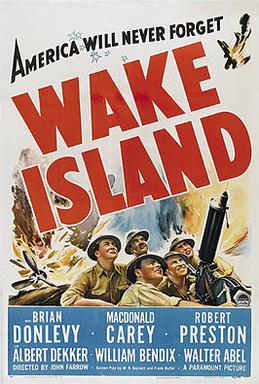
Wake Island is a 1942 American action drama war film directed by John Farrow, written by W. R. Burnett and Frank Butler, and starring Brian Donlevy, Robert Preston, Macdonald Carey, Albert Dekker, Barbara Britton, and William Bendix. The film tells the story of the United States military garrison on Wake Island and the onslaught by the Japanese following the attack on Pearl Harbor.

Wallace Fitzgerald Beery was an American film and stage actor. He is best known for his portrayal of Bill in Min and Bill (1930) opposite Marie Dressler, as General Director Preysing in Grand Hotel (1932), as Long John Silver in Treasure Island (1934), as Pancho Villa in Viva Villa! (1934), and his title role in The Champ (1931), for which he won the Academy Award for Best Actor. Beery appeared in some 250 films during a 36-year career. His contract with Metro-Goldwyn-Mayer stipulated in 1932 that he would be paid $1 more than any other contract player at the studio. This made Beery the highest-paid film actor in the world during the early 1930s. He was the brother of actor Noah Beery and uncle of actor Noah Beery Jr.

Noah Nicholas Beery was an American actor who appeared in films from 1913 until his death in 1946. He was the older brother of Academy Award-winning actor Wallace Beery as well as the father of prominent character actor Noah Beery Jr. He was billed as either Noah Beery or Noah Beery Sr. depending upon the film.

Noah Lindsey Beery was an American actor often specializing in warm, friendly character roles similar to many portrayed by his Oscar-winning uncle, Wallace Beery. Unlike his more famous uncle, however, Beery Jr. seldom broke away from playing supporting roles. Active as an actor in films or television for well over half a century, he was best known for playing James Garner's character's father, Joseph "Rocky" Rockford, in the NBC television series The Rockford Files (1974–1980). His father, Noah Nicholas Beery enjoyed a similarly lengthy film career as an extremely prominent supporting actor in major films, although the elder Beery was also frequently a leading man during the silent film era.
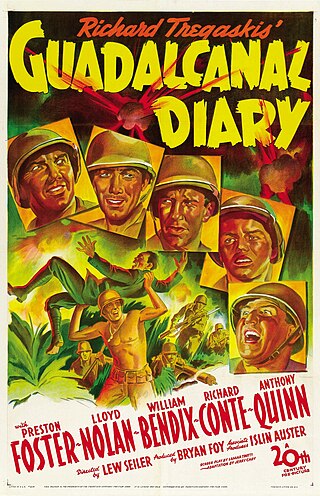
Guadalcanal Diary is a 1943 World War II war film directed by Lewis Seiler, featuring Preston Foster, Lloyd Nolan, William Bendix, Richard Conte, Anthony Quinn and the film debut of Richard Jaeckel. It is based on the book of the same name by Richard Tregaskis.

John Basilone was a United States Marine Corps Gunnery Sergeant who received the Medal of Honor for actions during the Battle for Henderson Field in the Guadalcanal campaign, and the Navy Cross posthumously for extraordinary heroism during the Battle of Iwo Jima. He was the only enlisted Marine to receive both of these decorations in World War II.
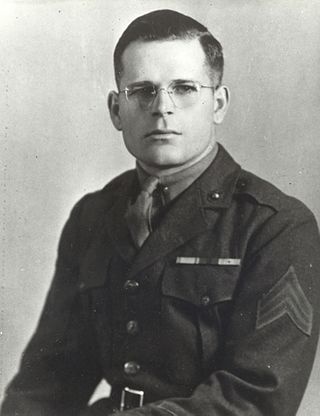
Grant Frederick Timmerman was a United States Marine who posthumously received the Medal of Honor for his heroic actions during World War II.
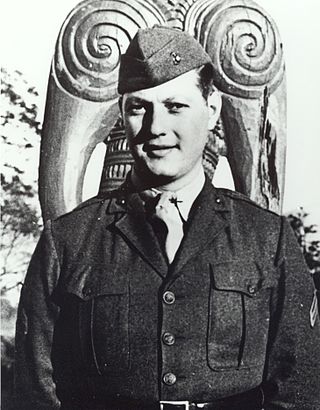
Sergeant Robert Allen Owens was a United States Marine who was killed in action in the Pacific campaign of World War II. He was posthumously awarded his nation's highest military award — the Medal of Honor — for his heroic actions on his first day in combat at Bougainville. The commanding general of the 3rd Marine Division described Owens' heroism — "Among many brave acts on the beachhead of Bougainville, no other single act saved the lives of more of his comrades or served to contribute so much to the success of the landings."
Harold George Schrier was a United States Marine Corps lieutenant colonel who served in World War II and the Korean War. In World War II, he was awarded the Navy Cross for leading the patrol that captured the top of Mount Suribachi, where he helped raise the first U.S. flag on Iwo Jima on February 23, 1945. In the Korean War, he was wounded in North Korea during the Battle of Chosin Reservoir while commanding a rifle company.

Sergeant Madden is a 1939 film noir forerunner directed by Josef von Sternberg and starring Wallace Beery. The supporting cast in this dark police crime drama, noted for its imaginative and evocative cinematography, includes Tom Brown, Laraine Day, Alan Curtis, and Marc Lawrence.

This Man's Navy is a 1945 World War II film about U.S. Navy blimps directed by William A. Wellman and starring Wallace Beery, Tom Drake, Jan Clayton and James Gleason. The supporting cast features Selena Royle and Beery's brother Noah Beery Sr., and presents a rare opportunity to see both Beery brothers work together in their later years. The picture is also one of the very few films, other than training films, to depict U.S. Navy airship operations.
Charles W. Lindberg was a United States Marine Corps corporal who fought in three island campaigns during World War II. During the Battle of Iwo Jima, he was a member of the patrol which captured the top of Mount Suribachi where he helped raise the first U.S. flag on the island on February 23, 1945. Six days later, he was wounded in action.

Joe Sawyer was a Canadian film actor. He appeared in more than 200 films between 1927 and 1962, and was sometimes billed under his birth name.
Gung Ho! is a 1943 American war film directed by Ray Enright and starring Randolph Scott. The story is based somewhat on the real-life World War II Makin Island raid led by Lieutenant Colonel Evans Carlson's 2nd Marine Raider Battalion.

Percy Herbert was an English actor. He worked predominantly from the 1950s into the 1970s and became one of the most recognisable faces in post-war British cinema.

To the Shores of Hell is a 1966 Vietnam war film shot in Technicolor and Techniscope that was directed by Will Zens and starring Marshall Thompson, Richard Arlen, Dick O'Neill and Robert Dornan that was distributed by Crown International Pictures. Dornan may possibly have co-written the film as his mother's maiden name was "McFadden".
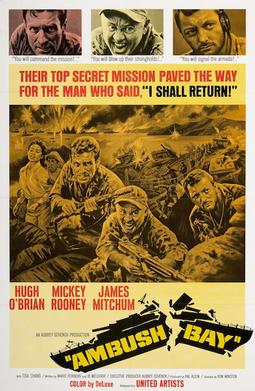
Ambush Bay is a 1966 American war film directed by Ron Winston and starring Hugh O'Brian, Mickey Rooney and James Mitchum. It was filmed on location in the Philippines.
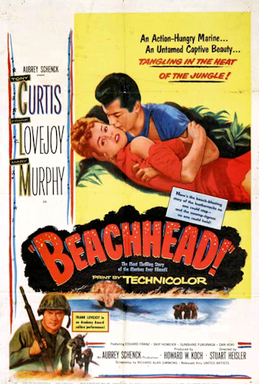
Beachhead! is a 1954 American Technicolor war film based on U.S. Marine Corps Captain Richard G. Hubler 1945 novel I've Got Mine about World War II. It was filmed on Kauai island in the Hawaiian Islands chain in the mid - Pacific Ocean by Aubrey Schenck Productions, released through United Artists studio and directed by Stuart Heisler.

Walter Sande was an American character actor, known for numerous supporting film and television roles.
















